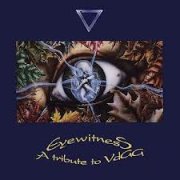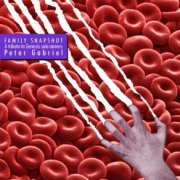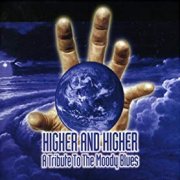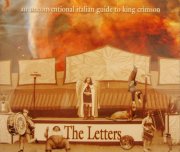




 |
 |
 |
 |
 |
|
Eyewitness Family Snapshot |
Higher & Higher The Letters |
Italy's estimable Mellow Records have been releasing current and reissued progressive albums from the '70s and '80s since the early '90s, doing a similar job to France's Musea, although they've largely concentrated on their own country's rich musical heritage. They've been releasing various-artist 'tribute' albums since the middle of that decade, both to individual artists and to 'scenes', many featuring the Mellotron in real or sampled form, to the point where it seems to make sense to give them their own page. The titles that are known to only contain samples have been quarantined at the bottom of the page.
 |
Eyewitness: A Tribute to VdGG (2005, 143.56) ****/T |
||
| Landberk: Afterwards TNR: Last Frame Gizmo: House With No Door Deus ex Machina: After the Flood Finisterre: Refugees Irrgarten: Still Life French TV: Pioneers Over C |
Zauber: Theme One Germinale: Meurglys III, the Songwriter's Guild C.A.P.: Faint-Heart and the Sermon Epicentro: Lemmings Luna Incostante: Necromancer Twenty Four Hours: Darkness (11/11) Nostalgia: Out of My Book |
Notturno Concertante: Vision Egoband: Arrow Finnegans Wake: Squid One Men of Lake: Killer Jay Tausig & Friends: Solitude Jay Tausig: On Tuesdays/Slender Threads Art & Illusion: Lizard Play |
|
Current availability:
Mellotrons used:
2005's Eyewitness: A Tribute to VdGG is almost a no-brainer; how badly can you go wrong getting a bunch of artists to pick and choose from such a strong catalogue? Very easily, actually, but, to everyone's credit, they don't. I'm not sure there's a single take on a Van der Graaf track here that made me grimace, although, of course, there are a couple of lesser efforts. Highlights include Landberk's superb Afterwards, opening the two-disc set, Finisterre's female-vocalled, chamber-prog take on Refugees and, perhaps surprisingly, French TV's ultra-digital Pioneers Over C. Luna Incostante's manic Necromancer, the usually fairly crummy Egoband's excellent Arrow and Men of Lake's barely-recognisable (in a good way) Killer are also worthy of note, although Zauber's Theme One, Epicentro's eccentric Lemmings and Art & Illusion's rather weak Lizard Play are less essential.
On the Mellotron front, Landberk provide us with the only definite genuine use, typically uncredited, with strings doubling the organ on their opening version of Afterwards, although Louie Mastro's strings on Jay Tausig & Friends' Solitude could well be real. On the sample front, Germinale stick strings all over Meurglys III, The Songwriter's Guild, with more of the same on CAP's Faint-Heart And The Sermon, both credited as if real. Naughty... Overall, then, a minor triumph, far better than most of Mellow's (not to mention other labels') frequently rather dismal efforts from the '90s. Worth hearing.
See: Van der Graaf Generator | Landberk | Finisterre | Germinale | CAP
 |
Family Snapshot: A Tribute to Genesis Solo Careers: Peter Gabriel (2013, 77.42) **½/½ |
||
| Gandalf's Project: Solsbury Hill Coral Caves: Here Comes the Flood Maurizio di Tollo: Mother of Violence Armalite: White Shadow Quarkspace: Exposure |
Goad: Biko TNR: Lay Your Hands on Me Alessandro Serri: Wallflower Tommy Eriksson: Red Rain Pierpaolo Bibbò: Don't Give Up |
Pistac: Blood of Eden Graziano Romani: Secret World Randone: Father, Son Periplo: Sky Blue |
|
Current availability:
Mellotron used:
Family Snapshot is one of several single-artist tribute albums released by Mellow in the early 2010s. Unlike most of the others, in Peter Gabriel, it tributes an artist whose career encompasses several styles, many only tangentially connected with progressive rock, such as it is, making it unsurprising that its contents are pretty varied. Unfortunately, several contributions suffer from poor English pronunciation, while I'm not sure that Alessandro Serri's decision to bookend his version of Wallflower with the piano intro/outro to Firth Of Fifth really works. Better tracks include Coral Caves' Here Comes The Flood, despite rewriting the vocal melody, Maurizio di Tollo's Mother Of Violence and Randone's Father, Son, although nowhere near enough to gain it a higher rating.
Surprisingly little samplotron, with vague, Mellotronish choirs on Armalite's White Shadow and Quarkspace's Exposure, leaving the set's only genuinely Mellotronic contribution to Randone, with occasional clicky flutes on Father, Son from Nicola Randone himself. I think you'd have to be a fairly major Gabriel fan to get anything much from this album and even then, disappointment is likely. Maybe not.
See: Randone
 |
Higher & Higher: A Tribute to the Moody Blues [Discs 1 & 2] (2006, 141.56) ***/T½ |
||
| Ryan Guidry: London is Behind Me Mikromidas: Go Now In the Labyrinth: Cities Hamadryad: Love is a Feeling Yolk: Peak Hour Joe Turner & the Seven Levels: Tuesday Afternoon Sonic Pulsar: The Sun Set Cinnamonia: Twilight Time Gap Party: Nights in White Satin Quarkspace: Legend of a Mind |
Faveravola: Voices in the Sky Jeff Bragg: The Best Way to Travel Mystery: Visions of Paradise Floating State: The Actor Extreme Reaction Force: Lovely to see You Algebra: Dear Diary Rousseau: Never Comes the Day Ines Tremis: Lazy Day Darxtar: The Dream Goad: Have You Heard, Part 1/The Voyage/Have You Heard, Part 2 |
Steve Tassler: I Never Thought I'd Live to Be a Hundred/Watching and Waiting Marco Masoni: Out and in Conqueror: Question Akacia: And the Tide Rushes in Sarax: Tortoise and the Hare Fantasyy Factoryy: It's Up to You Tantra: Melancholy Man Spirits Burning: The Story in Your Eyes |
|
Current availability:
Mellotrons used:
Higher & Higher: A Tribute to the Moody Blues does exactly what it says on the tin, at excruciating length. I mean, I'm all in favour of value for money, but a full-length, three-disc set is getting on for being as long as The Moodies' total output over their 'big seven' period. As with all such various artists efforts, many of the contributors merely slavishly ape the originals, but, as usual, enough of them do something different enough with the source material to make them worth the effort, a case in point being Mikromidas's six-minute, seriously progged-up take on Go Now (not that you can do much with that chorus) and Gap Party's radical reworking of Nights In White Satin. In the case of The Moodies, b-sides and solo careers throw up enough oddities to tempt more adventurous contributors, not least Deadwood Forest's vocalist, Ryan Guidry, who tackles Justin Hayward's debut solo single, London Is Behind Me, from 1965, while In the Labyrinth have a decent go at Nights In White Satin's flip, Cities.
Sounds like five genuine Mellotron tracks to my ears, quite a high proportion by tribute album standards, even when tributing such a Mellotron-heavy band. Guidry sticks obviously real Mellotron strings all over London Is Behind Me, Mikromidas add strings and flutes to Go Now, Peter Lindahl plays a string part on In the Labyrinth's Cities, an unknown musician plays full-on strings on Joe Turner & the Seven Levels' Tuesday Afternoon and someone, possibly Don Falcone, plays Mellotron church organ, strings and choirs on Spirits Burning's The Story In Your Eyes, the only relevant track not on the first disc. Unsurprisingly, many of the acts involved use Mellotron samples, including Hamadryad, Quarkspace, Mystery, Goad, Marco Masoni, Elegant Simplicity and Flamborough Head, amongst others.
To summarise: there's enough dead wood (note: not Deadwood) on here for Mellow to have easily trimmed this sprawling set down by a disc, improving the overall quality in the process. I'm sorry, but does ANYONE need versions of anything post-Seventh Sojourn? Really? Or, for that matter, the originals? Some decent tracks, then, but it takes a lot of digging to uncover the gems.
See: Moody Blues | Mikromidas | In the Labyrinth | Spirits Burning
 |
The Letters: an Unconventional Italian Guide to King Crimson [Disc 1] (2003, 79.07) ****/T |
|
| Stefano Bollani: Frame By Frame Germinale: Doctor Diamond Nema Niko: The Talking Drum Spirosfera: Cat Food Roversi Caimi Menotti: Discipline Soundvision: One More Red Nightmare Anatrofobia: The Sailor's Tale |
Tilion: One Time Taproban: Larks' Tongues in Aspic, Part 2 Three of a Charming Pair: Inner Garden I & II Prophexy: The Great Deceiver Giardini d'Autunno: Formentera Lady Psychonoesis: Starless |
|
Current availability:
Mellotron used:
'An Unconventional Italian Guide to King Crimson'? They ain't kidding! The Letters is actually one of the better tribute albums that's landed in my lap over the last year or so, the bulk of its content being just what it says on the tin: unconventional. Makes a nice change from 'slavishly copied', I have to say... Some of the more inventive versions include Stefano Bollani's excellent piano version of Frame By Frame, Psychonoesis' frankly peculiar Starless, Caboto's metallic jazz Moonchild and Mosaic Orchestra's brass-driven Red, while the award for 'worst English pronunciation' is split evenly between ZAQ's Maurilio Gigante and Aria Palea's Ninfa Giannuzzi ("Great de-ZI-ver..."), who clearly don't actually speak the language, but mistakenly think they can sing it.
Four bands are credited with Mellotron, although how many of those are genuine can only be a matter for speculation. Tilion's Alfio Costa sticks fairly murky sampled strings onto their THRAK, er, track, One Time, while Three of a Charming Pair, who sound a lot like a band formed just for the occasion, donate volume-pedalled strings to another THRAK effort, Inner Garden I & II, with Sergio Taglioni (ex-The Watch)'s credit saying both played and recorded by, making me think it's probably real. Of the other credited users, Giardini d'Autunno's Formentera Lady has what I presume are Mellotron cello samples, while Notturno Concertante's Cadence And Cascade seems to be entirely Mellotron sound-free, but they're not exactly known for using one, anyway. A handful of other artists use samples, but the heavy rearrangements on most tracks make the sound redundant, which is actually a good thing in this case.
See: King Crimson | Germinale | Cristiano Roversi | Tilion
1998's three-disc Fanfare for the Pirates: A Tribute to ELP does exactly what it says on the tin, for better or (mostly) worse, the vast majority of its contributions being either faithful recreations of Keith and the boys' pointlessly excessive oeuvre, or pretty awful reworkings of same. Are there any highlights? Sequenza Principale's Dedicato is, as you've probably gathered, a medley of ELP-related material, decent in places, while Prowlers manage a passable version of The Sage (from Pictures at an Exhibition, of course), one of the subtler efforts here. Lukala & Friends elongate Jerusalem into an ELP-esque epic and UK tribute act Noddy's Puncture head off-piste on their take on Fanfare, but, frankly, most of it's as bad as the originals (heresy alert! Heresy alert!).
As I'm sure you know, aside from their lone entry on this site, ELP were conspicuously Mellotron-avoidant, although a couple of samples creep in here. Strangely, the two obvious examples are the 'better tracks' I've already namechecked, with strings on the Court Of The Crimson King bit of Sequenza Principale's Dedicato and occasional, obviously-sampled strings on Prowlers' The Sage, although the jury's out on the strings on Phil Beane's Tank (as if it actually mattered). This album has one chief use: reminding the listener how bad most of the band's work actually was. Can I even recommend this to ELP fans? Not really, no.
Giant for a Life: A Tribute to Gentle Giant, is something of a mixed bag, I have to say. Containing everything from attempts at note-perfect copies (most of them) to imaginative rearrangements (Raymond Benson's solo piano take on Think Of Me With Kindness, for example), there isn't an awful lot here that you'd really want to spend good money on acquiring, unless you just have to have every note ever associated with the band. Many of the artists appear to be one-off conglomerations, both Sky Island and Glass Haus containing future members of the excellent Eccentric Orbit, although established outfits such as Italy's Zauber and Americans Fōnya and French TV contribute too. The best bits are where the artist does something with the material, so Advent's BITB (a variation on Boys In The Band) scores brownie points for a fresh arrangement, although the addition of unpleasant digital synths to other tracks by several offenders serves only to cheapen them, I'm afraid.
As far as the album's alleged Mellotron content is concerned, US musician Louie Mastro and Italian one-offs the Chocking Smokers Band (?!), consisting of various Germinale and Standarte members are the only two credited. The Chocking Smokers chaps' use has
to be considered suspect, as Germinale used samples on their albums, although Standarte owned an M400. Either way, it's effectively inaudible on their version of Nothing At All, as is Mastro's on Cogs In Cogs. Speaking of which, who ever
let this guy near a microphone? Worst vocals on the album by a long way, while the fairly obvious choirs
on Mastro's peculiar take on Acquiring The Taste are blatantly sampled. About the best thing I can say about this is that it's apparently considerably better than the first Giant tribute, Giant Tracks, although to be fair, I
haven't heard said record.
Harbour of Joy (a.k.a. Camel Tribute) is another in a seemingly endless line of Mellow Records 'tribute' albums, habitually compiled without reference to the band in question (see: Giant for a Life, above) and largely comprised of the same few bands. As usual, it's a combination of the slavishly-copied and 'is that really that song?', albeit far fewer of the latter than the former. A couple of the bands involved have had the sense to realise that Camel's strength lay in their melodic sensibilities and that they would often pad a couple of beautiful tunes out with considerable amounts of faff, so they've simply strung together some of the strongest melodies in medleys. You have to wonder at a couple of the choices, though; what possessed the otherwise unknown Strange New Toys (a pickup band, presumably?) to do the awful Down On The Farm from Breathless? There's surprisingly little material from Camel's acknowledged classic, The Snow Goose, too, but I suppose that's just the way these things pan out.
In fairness, most of the versions presented here are perfectly good, just not far enough from the originals to make them actually worth recording. I believe there was some controversy surrounding Louis Mastro's two contributions (Mastro can also be heard in similar form on Giant for a Life), where he was accused of playing someone else's MIDI files through a bunch of modules, then presenting the end result as his own work; the tracks certainly have that 'ultra-quantised' feel about them, or rather, complete lack of any feel at all. It seems the battle raged on Internet message boards for some time (back when most people outside universities didn't even have the 'Net), with different factions either accusing or defending him. Sadly, the matter is unlikely to be resolved, as Mastro committed suicide later the same year. The two events are not known to be connected. Anyway, the better efforts here are probably Evolution's Never Let Go, Fōnya's medley and Galahad's straight take on the gorgeous Lady Fantasy.
Mellotron? Three tracks on disc two (Raindances' Rhyader, CAP's Harbour Of Tears and Finisterre's Nimrodel) have Mellotron samples. Sadly, the Finisterre track is somewhat average, with some horrible synth brass just before the full-on fakeotron string part, with a few seconds of background choir later on. So; worth the effort? Well, how much of a Camel fan are you? Do you have to have everything? There are some good versions here, but, by and large, you're better off with the originals, as so often in these cases. Very little sampled Mellotron, too, so I'd only bother if you see it second-hand.
I shall never, ever understand the fanaticism displayed by Marillion fans. Recital for a Season's End: A Tribute to Marillion is a grinding, three-disc, near-four hour listen, as thirty-odd acts plod their way through poorly-composed, overlong sludge that should, in a sane world, be consigned to the dustbin of history. Seriously, this material is fucking terrible. Are there any more listenable moments? A handful of versions of songs by the later, Hogarth-fronted band aren't too awful, but none of it's actually good. And why is Coral Caves' vocalist singing, "A penny for your TOES" in Lavender? A handful of samplotron tracks, with unsubtle slabs of strings on Marco Masoni's Afraid Of Sunlight, obviously sampled strings on TNR's Living With The Big Lie, strings and choirs on Kbridge's White Russian and cellos and strings on J'Accuse's sixteen-minute (!) The Invisible Man. Listening to this has been a painful experience. Look on the bright side, though: no-one tackled bloody Grendel.
1996's two-disc The River of Constant Change: A Tribute to Genesis gathers together the usual crop of current Mellow outfits and one-off projects, throwing in the occasional overseas band to make up the numbers. Sadly, it features a minor epidemic of badly-transcribed material, with some dodgy chords on Decode's Can-Utility And The Coastliners, The Ancient Veil's irritating, pseudo-'ethnic' take on The Lamia and Mirage's Dancing With The Moonlit Knight, not to mention a too-early chord change on Notturno Concertante's Carpet Crawlers, repeated, just in case you thought it was a mistake. Worst of all, though, are German tribute Seconds Out. Back in my days working for ReGenesis, the band were given a video of this bunch's live show, which merely served to tell ReGen that they could do a better job without too much trouble. One of the worst parts was opener Watcher Of The Skies, with rushed and/or misheard keyboard chords on the intro, topped by a wincingly awful, heinously bad 'Mellotron key change' section, where they have trouble getting any of the chords right. And now I get the opportunity to hear this abomination again in the comfort of my own home. Oh joy.
This is starting to sound like a thorough pasting, so I must add that Submarine Silence's beautiful instrumental Entangled is probably the best thing here, other interesting efforts including Moongarden's Living Forever (from We Can't Dance), partially recorded in Genesis' early '70s style (pity they copped out in the second half) and T.M.A.'s vaguely ethnic Ravine, with several inoffensively straight versions to save the set from total ignominy. Saying that, we could probably have done without terrible Brit neo-proggers Final Conflict's straight take on the horrible No Son Of Mine (why? Why?) and Germinale's pretty rubbish The Knife. I mean, what made them think an out-of-key flute quote from Firth Of Fifth and some jokey spoken-word stuff were good ideas? Hang on, I thought I was trying to be nice about this...
Samplotronically-speaking, we get really rather poor string samples on Decode's Can-Utility And The Coastliners, strings and choirs on Moongarden's Living Forever and Galahad's straight take on The Chamber Of 32 Doors and slightly better strings on Seconds Out's Watcher Of The Skies. Can I recommend this to Genesis fans? Hmmm. A tiny handful of interesting rearrangements really isn't enough to excite any but the slavishly faithful (yes, you; you know who you are), so with more 'dogs' than 'delights', I probably have to say a reluctant 'no'.
The latest in a long line of prog tribute sets is Mellow's self-explanatory Tales From the Edge: A Tribute to the Music of Yes (2012), two discs of names familiar and otherwise (as with so many of these, I'm sure some of the 'artists' are one-off collaborations for the project). As with most (all?) of these efforts, both the quality and the originality of the contributions varies wildly, better efforts here including Periplo's violin-led acoustic take on To Be Over, ZeroTheHero's The Fish, Vanilla Project's superb pseudo-orchestral Heart Of The Sunrise, Aurora Lunare's Don't Kill The Whale (albeit not as good as Magellan's version on Tales From Yesterday), Raven Sad's Soon and Stefano Vicarelli's excellent piano version of Mood For A Day. Lesser efforts include Aquael's Run Through The Light, Greenwall's wispy Onward, Luca Scherani's Holy Lamb and all the competent-yet-pointless carbon copies, not least Yessongs' note-for-note Siberian Khatru (well, they are a tribute band).
No real Mellotron, obviously, the fakers being Yessongs, with strings and choirs (and brass?) on Siberian Khatru, Subterra, with strings on Shock To The System (I had to look this one up; it's on the terrible Union) more strings on Alessandro Corvaglia/Matteo Nahum's And You And I (although nowhere near as heavily as on the original), plus flutes on Marco Masoni's Show Me (whatever that's from). So; why so many tribute sets in the prog world? I can only think that they sell well enough to make their production worthwhile. Admittedly, there are a vinyl-length albums'-worth of genuinely good versions here, but the bulk of the set is essentially disposable. 'Tribute' shouldn't mean 'blatant copy'.
1999's To Canterbury & Beyond: A Tribute to the Canterbury Scene leaves me at something of a disadvantage, as I know relatively few of the originals, unlike many of Mellow's multi-artist sets, to the point where I've had to check up in most cases to see who actually performed the tracks first time round. An advantage of this, of course, is that I have no real expectations and can take the bulk of the material here at face value. And? David Bagsby's heavily-programmed take on Bill Bruford's Hell's Bells works surprisingly well (good source material helps, of course), as does Zoo Lunaire's fairly straight take on Gong's The Isle Of Everywhere, while the bulk of the remainder either drifted past inoffensively or managed to be perfectly pleasant, if unremarkable. The only obvious samplotron (and believe me, it's obvious) is the strings on Notturno Concertante's version of Caravan's Hello Hello, with the kind of sound that gives Mellotron samples a bad name. Dreadful. Overall, then, a decent enough set that's unlikely to impinge on non-genre fans, while you certainly won't be buying it for Notturno Concertante's contribution. Look on the bright side; at least nobody tackled the awful Golf Girl.
1997's monstrous four-disc Zarathustra's Revenge: A Tribute to Italian Progressive Rock of the Seventies is actually a pretty decent effort, but then, with so much fine music as source material, how could it be otherwise? Well, quite easily, actually, but most of the contributing artists either submitted pretty much straight copies, or not-too-appallingly updated versions, highlights including the ethno-fusion of Avarta's take on PFM's Mauro Pagani's Europa Minor (with me so far?), Marco Masoni's Franco Battiato medley, Massimo Mazzeo's acoustic guitar solo piece Vecchie Notti Distese Sulla Spuma Del Mare (Portici) and Gerard's typically deranged La Conquista Della Posizione Eretta (Banco del Mutuo Soccorso). Howlers? Nothing really heinous, although Mouse's rather fragmentary, eight-minute edit of Museo Rosenbach's mighty Zarathustra leaves something to be desired, not least as the original is one of the very best pieces to emanate from the scene.
No real Mellotron, by the sound of it, but on the samplotron front we get overt cellos and strings on Interface's Canto Del Capro (Cervello), Mouse's wonky strings on the aforementioned Zarathustra, strings on Audio's Sguardo Verso Il Cielo (Le Orme), Gerard's La Conquista Della Posizione Eretta, Arsnova's Epilogo (Il Balletto di Bronzo), Eftus' Favole Antiche (Celeste) and particularly weedy ones on Notturno Concertante's Coffee Song (Acqua Fragile). Well, if nothing, else, this serves as a decent primer to the '70s Italian scene, although it's noticeable just how many of the artists here tackle PFM. Reason? It's difficult to argue with the proposition that they were not only the most popular of these bands, but also fairly easily the best.